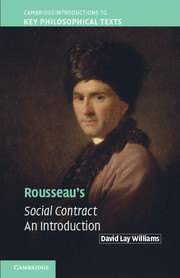Introduction
Published online by Cambridge University Press: 05 June 2014
Summary
If the significance of a political treatise can be measured by the volume and vehemence of its commentators, then Jean-Jacques Rousseau’s Social Contract easily stands out as among the most important works of its kind. Within weeks of its publication in 1762, it was banned in France. Less than a month thereafter, Rousseau found himself effectively banished. He sought refuge in his boyhood home of Geneva, only to find his book being burned in the public squares. Perhaps his best-known literary contemporary and interlocutor, Voltaire, would call the Social Contract the “Unsocial Contract, by the not very sociable Jean-Jacques Rousseau.” He subsequently endorsed Rousseau’s banishment from Geneva, remarking, “Let the Council punish him with the full severity of the laws … as a blasphemous subversive who blasphemes Jesus Christ while calling himself a Christian, and who wants to overturn his country while calling himself a citizen.” Time did not mellow critics of the Social Contract. A generation later, Benjamin Constant argued that “the subtle metaphysics of the Social Contract can only serve today to supply weapons and pretexts to all kinds of tyranny, that of one man, that of several and that of all, to oppression either organized under legal forms or exercised through popular violence.” Shortly thereafter, the nineteenth-century socialist Pierre-Joseph Proudhon would comment, “It is this [social] contract of hatred, this monument of incurable misanthropy, this coalition of the barons of property, commerce and industry against the disinherited lower class, this oath of social war indeed, which Rousseau calls Social Contract, with a presumption which I should call that of a scoundrel.”
In the twentieth century, in the wake of two horrific world wars, Rousseau became a favorite target of liberal intellectuals. Isaiah Berlin labeled him “the most sinister and most formidable enemy of liberty in the whole history of modern thought.” Bertrand Russell warned that the Social Contract’s “doctrine of the general will … made possible the mystic identification of a leader with his people, which has no need of confirmation by so mundane an apparatus as the ballot-box.” The philosopher of science, Karl Popper, would call Rousseau “one of the most pernicious influences in the history of social philosophy.”
- Type
- Chapter
- Information
- Rousseau's Social ContractAn Introduction, pp. 1 - 25Publisher: Cambridge University PressPrint publication year: 2014



